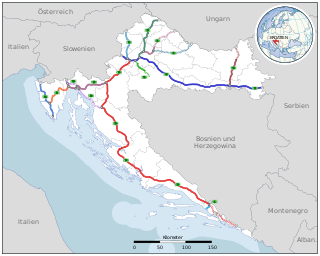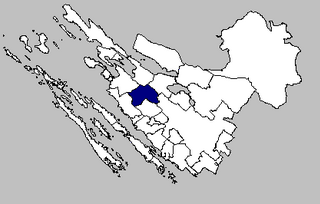Dračevac may refer to:
- Dračevac, Istria County, a village near Poreč, Croatia
- Dračevac, Zadar, a village near Zadar, Croatia
- Dračevac Ninski, a village near Poličnik, Croatia
- Dračevac, Split, a part of Mejaši, a section of Split, Croatia
Dračevac may refer to:

Transport in Croatia relies on several main modes, including transport by car, train, ship and plane. Road transport incorporates a comprehensive network of state, county and local routes augmented by a network of highways for long-distance travelling. Water transport can be divided into sea, based on the ports of Rijeka, Ploče, Split and Zadar, and river transport, based on Sava, Danube and, to a lesser extent, Drava. Croatia has 9 international airports and several airlines, of which the most notable are Croatia Airlines and Trade Air. Rail network is fairly developed but regarding inter-city transport, bus tends to be far more common than the rail.

Brač is a Croatian island in the Adriatic Sea, with an area of 396 square kilometres (153 sq mi), making it the largest island in Dalmatia, and the third largest in the Adriatic. It is separated from the mainland by the Brač Channel, which is 5 to 13 km wide. The island's tallest peak, Vidova gora, or Mount St. Vid, stands at 780 m (2,560 ft), making it the highest point of the Adriatic islands. The island has a population of 13,931, living in twenty-two settlements, ranging from the main town Supetar, with more than 3,400 inhabitants, to Murvica, where less than two dozen people live. Brač Airport on Brač is the largest airport of all islands surrounding Split.

Zadar is the oldest continuously inhabited city in Croatia. It is situated on the Adriatic Sea, at the northwestern part of Ravni Kotari region. Zadar serves as the seat of Zadar County and of the wider northern Dalmatian region. The city proper covers 25 km2 (9.7 sq mi) with a population of 75,082 in 2011, making it the second-largest city of the region of Dalmatia and the fifth-largest city in the country.
Poljica may refer to:

The Kingdom of Dalmatia was a crown land of the Austrian Empire (1815–1867) and the Cisleithanian half of Austria-Hungary (1867–1918). It encompassed the entirety of the region of Dalmatia, with its capital at Zadar.
Obrovac may refer to:
The 1991 riot in Zadar was an act of violence that took place in the Croatian city of Zadar on 2 May 1991. Following an incident in the Zadar hinterland in which a Croatian policeman was killed, reportedly by SAO Krajina militiamen, Croatian civilians vandalized, destroyed and looted properties belonging to ethnic Serbs and Yugoslav companies in the city.

The Dalmatian Hinterland is the southern inland hinterland in the historical Croatian region of Dalmatia. The name zagora means "beyond (the) hills", which is a reference to the fact that it is the part of Dalmatia that is not coastal and the existence of the concordant coastline where hills run parallel to the coast.

Poličnik is a village and a municipality within Zadar County in Croatia.
The Battle of Zadar was a military engagement between the Yugoslav People's Army, supported by the Croatian Serb Serbian Autonomous Oblast of Krajina, and the Croatian National Guard, supported by the Croatian Police. The battle was fought north and east of the city of Zadar, Croatia, in the second half of September and early October 1991 during the Croatian War of Independence. Although the JNA's initial orders were to lift the Croatian siege of the JNA's barracks in the city and isolate the region of Dalmatia from the rest of Croatia, the orders were amended during the battle to include capturing the Port of Zadar in the city centre. The JNA's advance was supported by the Yugoslav Air Force and Navy.
Croatian National Theatre is the official name of several state-funded theatre houses in Croatia. Each one is commonly referred to by the Croatian-language initialism HNK. The four theatre houses in biggest cities are considered premier theatre and opera houses in the country. In addition, there are three other smaller theatres carrying that name in Croatia and one in Bosnia and Herzegovina.

Arbanasi is an ethnic community in and around the city of Zadar in the northern Dalmatia region of Croatia, who are of Albanian ethnic origin. They are traditional speakers of the Arbanasi dialect of Gheg Albanian. Their name is an obsolete way to say Albanians in Croatian and is the toponymy of the first Arbanasi settlement in the region, which today is a suburb of Zadar. In Albanian literature, they are known as "Albanians of Zadar".
Podgrađe is a Serbo-Croatian place name, a toponym derived from pod ("below") and grad ("town"), when in the Middle Ages "grad" was a term used for a fort, fortress, castle. It was part of wider urban area of a fortress or a castle, and/or a settlement adjacent to it, and can be referred to or translated as a castle town or a market town, as in nomenclature used for urban development in the medieval Europe.
Poljana may refer to:
Starigrad may refer to:

4th Guards Brigade "Spiders" was a brigade of the Croatian Army which took part in the Croatian War of Independence. It was one of the best-known units in the war and it was active until a 2008 reorganization when it was merged into the Motorized Guard Brigade.
Golubić is a Serbo-Croatian toponym. It may refer to:
The Čudomirić family was one of the twelve noble tribes of the Kingdom of Croatia, mentioned in the Pacta conventa and Supetar Cartulary.
The Kukar family was one of the twelve noble tribes of the Kingdom of Croatia, mentioned in the Pacta conventa and Supetar Cartulary.
Fortica may refer to: